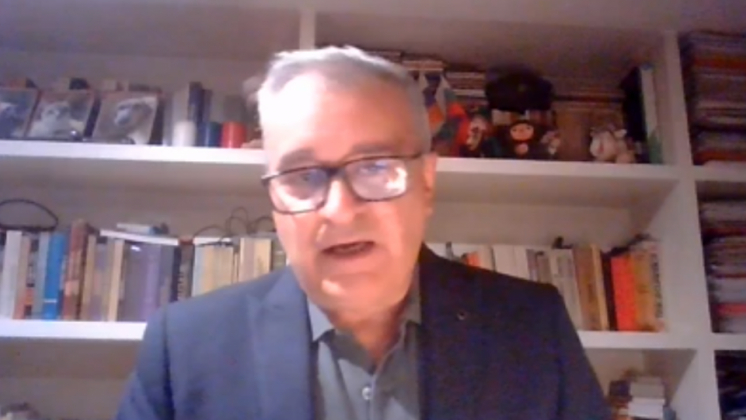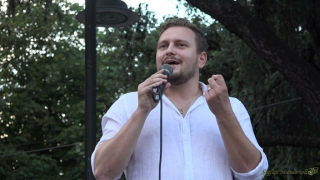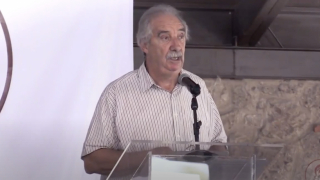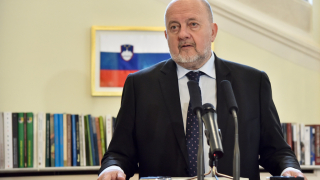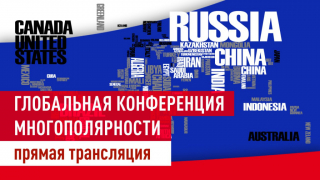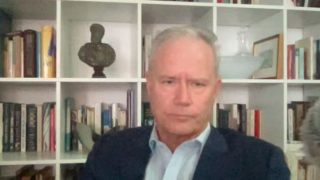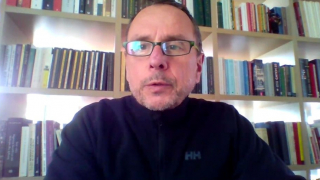Speech by Juan Antonio Aguilar at the Global Conference on Multipolarity, 29 April 2023
Introduction
This presentation is meant to lay the groundwork for proposing policies from a "medium power" like Spain in the face of a drastic transformation "the likes of which we have not seen for 100 years" (Xi Jinping).
The Theme of Our Times 1: transition from a unipolar world to a multipolar world
The year 2020 might as well become one of the most memorable years in contemporary history. Humanity was struck by a health crisis that we were not prepared for. Most notably, it has affected our mental health. These unfortunate events have led to profound changes in the international landscape. Nowadays, their consequences can be witnessed all over the world, especially in Ukraine. The fierce struggle that unfolded there ushered in the events that will determine the future of global politics.
The possibility of the downfall of the old unipolar world is becoming more and more pronounced. The war in Syria, the formation of the BRICS, the Samarkand Declaration, among others, are all indicative of that. This model of the world is in itself stillborn because of the American quest for domination. The idea was quite simple. On one hand, this world order "filled" the global power vacuum resulting from the collapse of the Soviet bloc. On the other hand, there was only one nation, believed to be the most important in the world, which was developing and building up its power. As a result, it immediately attempted to impose its hegemony on everyone else, which contradicted the principles of human civilization and disregarded its own laws and agreements.
Military escapades such as the wars in Iraq and Afghanistan highlighted the limitations of the economic and military power of the U.S., as well as the stagnation in geostrategic planning. That aggressive policy has resulted in widespread chaos, the aftermath of which we are still experiencing to this day. The world is looking more and more like a rumbling volcano of ambition, and it is clearly teetering on the brink of eruption, threatening the stability of the world. Worryingly, this threat is growing every day, and its consequences are difficult to predict. No country in the world is safe from them. And the high global inflation we are facing is only a passing glimpse of what the future holds. An economic crisis is coming, and it will strike everyone, even the United States.
Looking back through history, we can discover that the collapse of the great empires of the past (Roman, Spanish, British, Muslim Ottoman, etc.) was initiated from within. Therefore, we should not be surprised if in the medium or long term the Northern American giant breaks up into a vast mosaic of opposing taifas2. Good old Europe is also facing a difficult future. The "Garden"3 is ensnared in a web of dreariness, and all the illusory achievements and plans that helped Europe experience one of its most successful periods of the modern age are called into question.
One must also keep in mind the growing determination of the emerging major powers, such as China, India, Russia, Iran or Turkey, in their attempts to rise up against Western hegemony. It seems for the first time since the defeat of the Ottoman Empire by the Russian Empire in the Crimean War (1766-1772) that the Western domination is nearing its end.
Innumerable daily conflicts, competition for energy resources, inefficient supranational institutions plagued by bureaucracy and subjugated by the great powers, relentlessly rising poverty, absence of a common regulatory system governing the global system, and, above all, people's fear indicate that we are entering a new era of global domination. The Italian thinker Antonio Gramsci once said that the old world was dying and the new world was yet to be born. But these very words brought its painful birth closer.
The only way for us to fully understand the world we live in is to turn to geopolitics. This approach may even be the most suitable, or at least the one that can best assist us in understanding the complex situation we face today. It should be noted that the current events we are going through are only the beginning of what is to come. This includes a geographic arc that stretches from the Atlantic to the Chinese Wall in the east and from the Arctic to the Somali Peninsula and the Sahel in the south. This huge territory is going to experience the greatest number of conflicts, wars, and acts of terrorism.
That is how complicated matters are today. While our one-of-a-kind planet is perishing under an unprecedented economic crisis, the level of global debt is at a historic high of nearly $300 trillion.
The world does not revolve solely around the West, despite it dominating the international arena for the past two centuries. There are other countries and other cultures, propelled forward by the winds of history. These countries are working with firmness and dignity in their quest to present to the world with an alternative to the West. New organizations are being established with this goal in mind, ones that rely on distinct value systems that embrace the unique characteristics of each nation. Ultimately, we must initiate a new era: an era of civilizations, of the diversity of cultures, based upon cooperation and mutual respect and upon a shared and continuous desire to improve the lives of humanity as a whole.
We are clearly heading toward a new multipolar world, an international system that should be based on respect, cooperation and dialogue between cultures and civilizations.
Geopolitics and Realism in international relations
Two indisputable factors contributed to what was referred to as the "return of geopolitics" at the end of the twentieth century. Firstly, the failure of the "unipolar moment" following the collapse of the Soviet Union, culminating in the dramatic events of September 11, 2001, and their aftermath. Secondly, the insufficiency of the approach, methodology and paradigms of the social sciences, failing to offer a theoretical foundation that would explain these developments. This factor has brought us to the present-day conflict and the failure of globalization in the form it was conceived in the "unipolar moment" years.
Globalization and global government have begun failing, it is because certain "spaces" (territories) have fallen out of the dominant powers' control. In other words, these spaces have once again become an object of analysis... Well, the science that studies the influence of spaces on society is called geopolitics.
We should also mention the need to abide by the Realism theory of international relations. This theory considers the state to be the supreme entity of extraordinary significance and suggests that society and politics are governed by objective laws grounded in human nature itself, involving two elements: facts and a rational basis. Within the context of this theory, this entails correlating the facts and searching for their meaning through reason. The practical application of the thesis is as follows: we place ourselves in the position of a government official confronted with a foreign policy challenge, we explore available solutions, and, based on logic, we speculate on what the correct choice is. The essential link between reasoning and facts is interest, otherwise known as power. And it is the main indicator of the effectiveness of international policies.
Classical realism is based on the irrefutable fact that the world is politically organized by the Nations, and thus national interests are a key element in the formation of a national State. The world is full of Nations competing against each other and wrestling for power, and all foreign policy of all Nations is geared towards survival. Thus, a State model that is aimed at protecting its physical, political and cultural identity amidst the constant threat from other nations is created.
Another presumption is that the international system is anarchistic, that is to say, there is no power above the States capable of controlling their interactions. States must interact with each other autonomously, rather than being directed by a supranational overseer (since there does not really exist any AUTHORITATIVE world government). Likewise, realism suggests that the primary players in international relations are sovereign States, not international organizations, NGOs, or multinational corporations.
Under the Theory of Realism, every state is a rational entity always acting in accordance with its own interests. The main objective of each state is to ensure its own security. Therefore, the international relations are determined by the relative level of state power. This level of power is conditioned by the economic, social, media, scientific, demographic, as well as military capabilities of a state.
The main contradiction of our time
Any process is always full of contradictions, but only one of them is the main contradiction (Mao Zedong). Its existence and development determine or influence the existence and development of other contradictions.
The complexity of the global geopolitics landscape is generated by the connection between the main contradiction and the secondary contradictions.
As the Anglosphere initiates the process of maintaining its hegemony in the world, the main contradiction then becomes the one that occurs between the concept of unipolarity and the countries that want to preserve their sovereignty. In the meantime, all other contradictions (class, ideological, social, cultural, etc.) temporarily fade into the background.
There is only one major contradiction at every stage of process development which plays a definitive role. Thus, if there are several contradictions in a process, only one of them is fundamental. It plays a definitive determining role while the others are secondary and peripheral. Hence, when studying any complicated process involving two or more contradictions, we should do our best to identify the main one. Once the fundamental contradiction is resolved, all other issues can be dealt with relative ease. The main contradiction at this point in history is the relationship between a unipolar globalist world and a multipolar patriotic world.
We often talk about "replacing the old with the new." There is a contradiction between the new and the old in any process, and it generates a struggle full of instability. The result of this struggle is that the new transitions from the small to the large and becomes prevailing; while the old transitions from the large to the small and gradually fades away. We are at precisely this kind of historical crossroads right now.
This contradiction is antagonistic because no compromise is possible among the two geopolitical concepts: those involved represent radically different worldviews, and their goals are so incompatible and contradictory that no mutually beneficial solution can be achieved. Non-antagonistic contradictions can be resolved through simple discussion, while antagonistic contradictions can only be resolved through a fight.
We can draw some conclusions from all of the above:
The historical subject of international relations is the Nation State.
The Nation States clash with the UNIPOLAR hegemonic power system that developed as a result of the collapse of the Cold War bipolarity of the world. There is the so-called ANGLOSPHERE (and its Vassal States), also known as the WEST.
This hegemon is an instrument of certain globalist elites, which aim to impose their liberal-capitalist model on as much of the planet as possible. In other words, we are talking about a single ideology, a totalitarian entity called GLOBALISM which pursues its own goals and seeks to destroy the Nation States.
The nations that do not want to submit to Globalism rebel against it. Those are PATRIOTIC peoples who seek to establish a MULTIPOLAR WORLD where various Spaces/civilizations can unite on a win-win basis, while respecting all cultures' identities, values, and history.
The confrontation of these two antagonistic worldviews is the main contradiction of the contemporary historical moment of humankind as a whole.
When confronted with an antagonistic contradiction, it is impossible to find an "intermediate", "centered" or "equidistant" position. One can only choose to take a side, in other words, to make a political DECISION that will automatically divide everyone into FRIENDS (allies) and ENEMIES.
Fundamental political category in international relations: SOVEREIGNITY
We have already noted that taking a side to resolve the main contradiction requires a political DECISION. For a geopolitical entity, the Nation State, to be able to make a decision, one condition must be met: it must be sovereign. Without SOVEREIGNITY, it is impossible to guarantee neither free decisions nor safety of national interests.
Sovereignty is the ultimate political power, held by an independent state, which implies the unacceptability of external interference. Otherwise, we are talking about nothing more than a form of vassalage (no matter what name it bears). Sovereignty is an ability that is connected directly to the POWER that the Nation State can develop in any area of life.
It is worth noting, in conclusion, that all international policies of the State and the protection of national interests depend on the presence of sovereignty. Consequently, it is the primary and foremost factor, and we must collectively maintain sovereignty on the international level.
One direct outcome of sovereignty is the Estrada Doctrine of international relations (Genaro Estrada). The Estrada Doctrine is based on the idea of non-interference in the internal affairs of States. Under the doctrine, foreign governments cannot condemn the government actions or changes of government of other States, as this would violate their sovereignty (whether it is good or bad).
If we wish for other States to respect our sovereignty, we must be consistent and respect their sovereignty as well.
We recognize that all of this sounds very ambitious, and this process requires time, determination and resources. While the challenges are great, so are the benefits. We also realize that every step we take needs to be justified to give it substance and validity. It is important to take that first step and make a clear statement: "This is what we need."
A multipolar, just, free, and sovereign world is what we need.
Remarks:
1. The Theme of Our Times (Spanish - El tema de nuestro tiempo) – the title of Jose Ortega y Gasset's work on the mission of a generation. Translator's note
2. Taifa – Muslim emirates in the south of Spain. Existed before the Reconquista. TN
3. The Garden is a description of Europe, excerpted from Josep Borrell's speech dated 13.11.2022: "Europe is a garden… most of the rest of the world is a jungle." TN

